Chair meditation teaches you to cultivate present-moment awareness while accommodating mobility challenges that traditional meditation can’t address. You’ll learn to reduce anxiety and depression by breaking free from ruminating thoughts, building emotional resilience through neuroplastic changes in your brain. This accessible practice helps you manage chronic pain, improve sleep quality, and develop healthy coping mechanisms for aging-related stress. It also fosters community connections and enhances mental clarity. Discover how these transformative techniques can revolutionize your approach to wellness.
Understanding Chair Meditation for Seniors
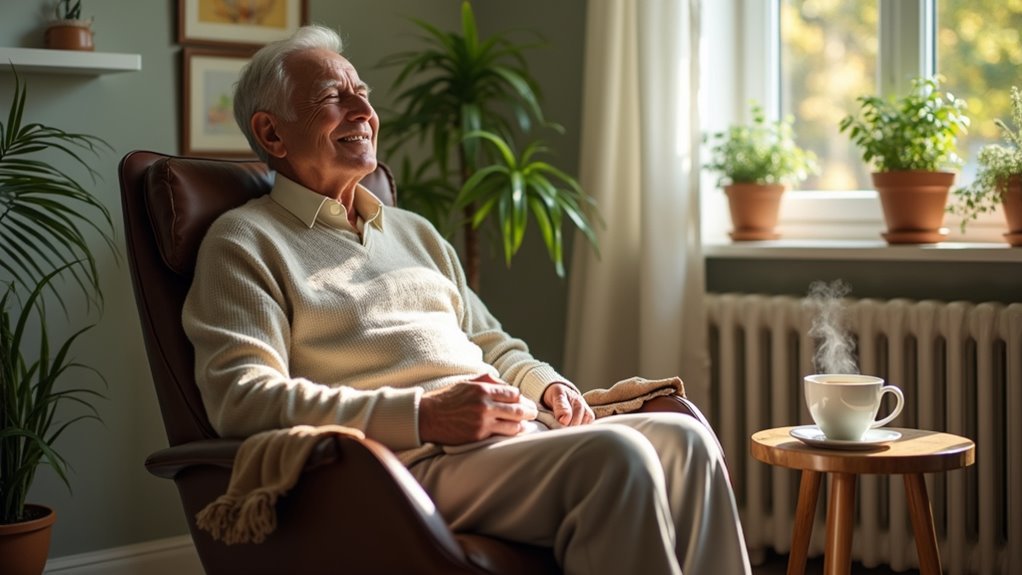
While traditional meditation often requires sitting on the floor or maintaining specific postures, chair meditation offers seniors a practical alternative that doesn’t compromise on benefits.
You can practice this versatile form of mindfulness anywhere, making it perfect when you’re dealing with mobility challenges or balance issues. Unlike Chair Yoga, which focuses on physical movement, chair meditation emphasizes mental stillness and present-moment awareness.
You’ll find this practice accommodates various physical limitations while delivering powerful emotional benefits. Research shows it reduces anxiety and depression symptoms, helping you break free from ruminating thoughts about past regrets or future worries.
You can easily integrate chair meditation into your daily routine, managing stress and enhancing mental health without extensive physical exertion. It’s accessibility meets effectiveness.
The Science Behind Mindfulness and Aging
When you practice mindfulness meditation regularly, you’re actually rewiring your brain’s neural pathways in ways that specifically benefit aging adults.
Your brain develops stronger connections in areas responsible for attention and emotional regulation while reducing activity in regions associated with stress and anxiety.
You’ll also activate your body’s relaxation response, which counteracts the chronic stress that often accelerates age-related cognitive decline and physical health issues.
Brain Changes Through Meditation
As you settle into your meditation practice, remarkable changes begin occurring within your brain’s structure and function.
Mindfulness meditation triggers powerful neuroplastic adaptations that reshape your aging brain in extraordinary ways.
Your brain transforms through these measurable changes:
- Gray matter density increases in memory and emotional regulation centers, reversing age-related decline.
- Prefrontal cortex strengthening enhances your decision-making abilities and emotional control.
- Neural connections multiply as your brain develops new pathways for cognitive processing.
- Cortisol levels drop considerably, reducing stress hormones that damage brain tissue over time.
These neurological improvements translate directly into enhanced attention, sharper focus, and better working memory.
You’re literally rewiring your brain for ideal cognitive health, proving that age doesn’t have to mean mental decline.
Stress Reduction Mechanisms
Throughout your meditation sessions, your body activates sophisticated biological mechanisms that systematically dismantle stress at the cellular level.
When you practice mindfulness meditation regularly, you’ll experience significant reductions in cortisol, your body’s primary stress hormone. This hormonal shift directly alleviates anxiety and stress symptoms that commonly affect older adults.
Your brain’s neuroplasticity responds remarkably to mindfulness practices, creating new neural pathways that enhance emotional regulation.
You’ll notice improved mental health as depression symptoms decrease through consistent meditation. The present-moment awareness you develop replaces harmful rumination about past regrets or future worries.
This focused attention particularly benefits you when facing aging-related stressors.
Your overall well-being improves as meditation fosters community connections, reducing loneliness while strengthening your health foundation for successful aging.
Stress Reduction Through Present-Moment Awareness
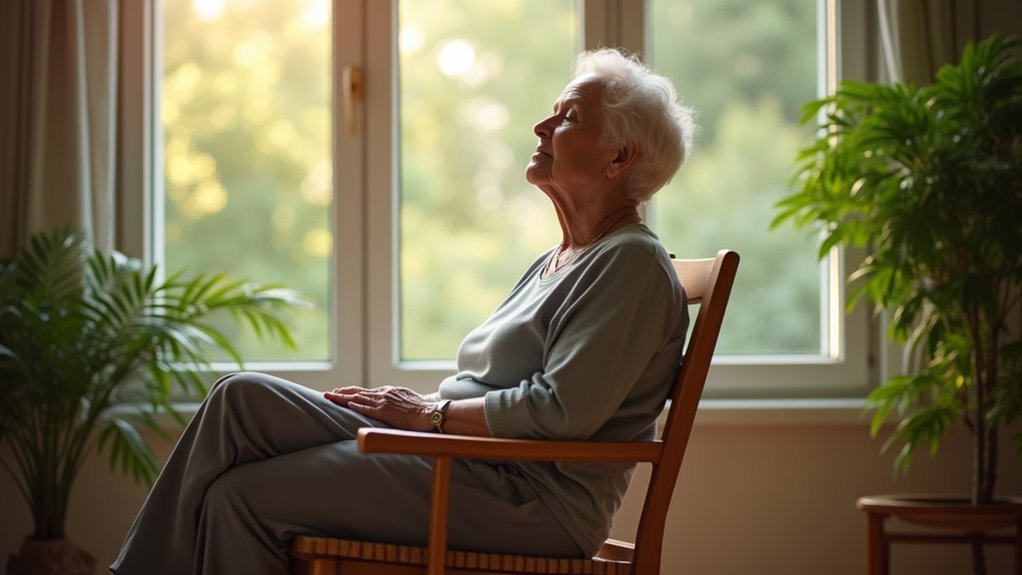
When you practice chair meditation, you’ll naturally break free from the endless loop of worrying about tomorrow’s doctor’s appointment or dwelling on yesterday’s mistakes.
This present-moment focus helps calm your racing thoughts, creating mental space between you and the anxiety that often accompanies aging.
You’ll also find it easier to accept the physical changes your body experiences, viewing them with compassion rather than resistance.
Breaking Worry Cycles
Worrying thoughts often trap older adults in endless mental loops, cycling between regrets about the past and anxieties about the future. Chair meditation breaks these destructive patterns by anchoring your attention to the present moment.
When you’re focused on breathing exercises and immediate sensations, there’s no mental space for worry to flourish. This practice teaches you to recognize when your mind wanders into anxious territory and gently redirect it back to now.
Consider how chair meditation transforms your worry cycles:
- You’ll notice racing thoughts losing their grip on your peace
- Your mind finds relief from constant “what if” scenarios
- You’ll experience moments of genuine calm amid life’s uncertainties
- Your confidence grows as you master redirecting anxious thinking
Regular practice empowers you to interrupt worry before it spirals out of control.
Calming Racing Thoughts
As your mind races with scattered thoughts about doctor appointments, family concerns, or daily tasks, chair meditation offers a gentle anchor to pull you back into stillness. This accessible practice helps you focus on breathing and bodily sensations, greatly reducing mental chatter and stress.
| Racing Thought Triggers | Chair Meditation Response |
|---|---|
| Health worries | Focus on breath rhythm |
| Financial concerns | Ground through body awareness |
| Family stress | Return to present moment |
| Daily overwhelm | Practice gentle observation |
| Future anxieties | Cultivate acceptance |
A qualified yoga teacher can guide you through techniques that break rumination cycles. By consistently practicing present-moment awareness, you’ll develop the ability to recognize anxious thoughts without becoming consumed by them, fostering emotional well-being and self-compassion.
Accepting Body Changes
Beyond quieting mental chatter, chair meditation provides a compassionate framework for embracing the natural changes your body experiences with age. Through mindful breathing and present-moment awareness, you’ll develop a healthier relationship with your evolving physical self.
This practice helps break negative thought cycles about aging while fostering acceptance of your body’s limitations.
Accepting body changes through chair meditation supports your mental health by:
- Reducing anxiety about physical decline and aging fears
- Cultivating self-compassion when facing mobility or health challenges
- Decreasing depression symptoms linked to body image concerns
- Building emotional resilience to manage age-related stressors like loneliness
Regular practice enables you to remain calm and centered, transforming how you view your changing body from resistance to graceful acceptance.
Managing Anxiety and Depression Naturally
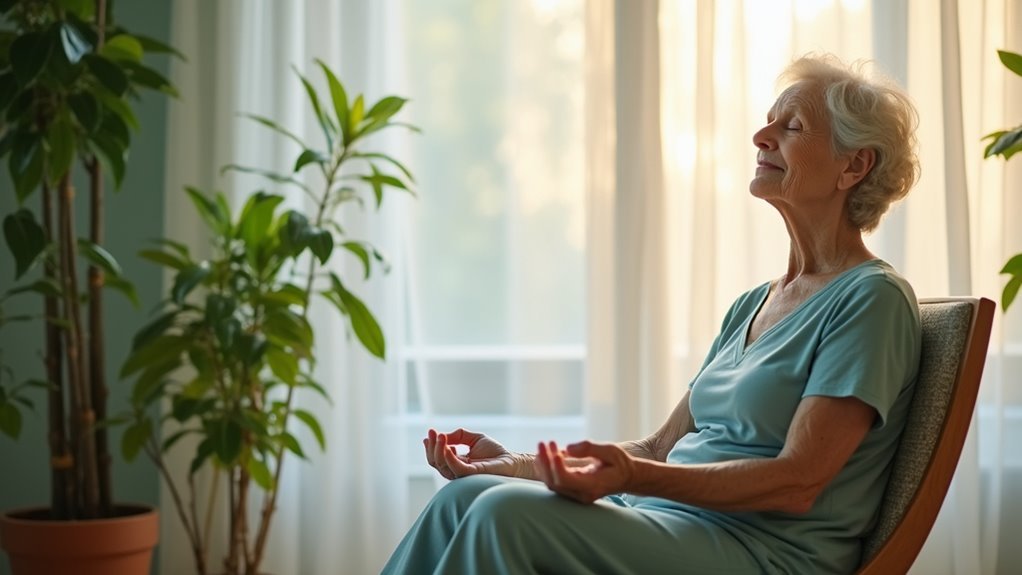
When life’s challenges weigh heavily on your mind, chair meditation offers a powerful, natural approach to managing anxiety and depression that doesn’t require medications or complex treatments. Through consistent mindfulness practice, you’ll markedly reduce symptoms while improving your emotional well-being.
Chair meditation provides a gentle, medication-free path to naturally reduce anxiety and depression through consistent mindfulness practice.
This gentle method helps you manage worries about aging, health, and finances more effectively. Research shows that mindfulness meditation decreases ruminative thoughts, breaking anxiety cycles and promoting positivity.
Since chair meditation accommodates mobility issues, you can easily integrate it into your daily routine. The practice encourages present-moment awareness, helping you focus on now rather than dwelling on past regrets or future fears.
This shift naturally alleviates anxiety and depressive symptoms, giving you practical tools for emotional resilience.
Building Emotional Resilience in Later Years
Chair meditation doesn’t just help you manage immediate symptoms of anxiety and depression—it builds lasting emotional resilience that strengthens your ability to navigate life’s ongoing shifts.
The health benefits extend far beyond symptom relief, creating a foundation for emotional strength that serves you throughout your later years.
Regular practice develops essential skills that enhance your ability to cope with aging’s unique challenges:
- Present-moment awareness breaks the cycle of ruminating thoughts about health concerns and aging fears.
- Self-compassion reduces harsh self-criticism and builds a positive self-image during changes.
- Stress management empowers you to handle loneliness, financial worries, and health anxieties more effectively.
- Cognitive enhancement improves emotional regulation and mental clarity for better decision-making.
These skills compound over time, creating unshakeable emotional resilience.
Improving Focus and Mental Clarity
As your meditation practice deepens, you’ll notice your ability to concentrate sharpens dramatically.
Chair meditation encourages present-moment awareness, training your mind to stay engaged with current experiences rather than getting lost in distractions. This focused attention translates into improved cognitive function and memory retention in your daily life.
Regular chair meditation sessions break the exhausting cycle of ruminating thoughts that often cloud clear thinking.
When you’re seated comfortably and practicing mindfulness techniques, you’re fundamentally rewiring your brain for better focus. The relaxation response triggered during these sessions reduces anxiety and stress levels, creating ideal conditions for enhanced mental clarity.
You’ll find that incorporating chair meditation into your routine fosters emotional calmness that directly supports sharper concentration and mental acuity throughout your day.
Pain Management and Physical Comfort
You’ll find that chair meditation offers powerful relief from chronic pain by helping your body release tension and promoting deep relaxation.
The gentle movements incorporated into your practice can improve circulation and flexibility without straining your joints or muscles.
As you reduce stress through mindful breathing and body awareness, you’ll also decrease the stress-related pain that often amplifies physical discomfort in older adults.
Chronic Pain Relief
Many older adults find that chronic pain becomes a constant companion, affecting everything from sleep quality to daily activities.
Chair meditation offers you a gentle yet powerful approach to managing this persistent discomfort. Through mindful breathing and relaxation techniques, you’ll reduce muscle tension while enhancing oxygen flow throughout your body.
Chair meditation transforms how you experience chronic pain by:
- Breaking the mental cycle – You’ll stop ruminating thoughts that amplify your discomfort.
- Promoting deep relaxation – Your muscles release tension you didn’t even realize you were holding.
- Improving emotional resilience – You’ll develop better coping strategies for difficult days.
- Restoring personal control – You’ll feel empowered to actively manage your pain rather than being its victim.
Regular practice gives you practical tools for reclaiming comfort and quality of life.
Gentle Movement Benefits
While chair meditation centers on mindfulness and breathing, incorporating gentle movements transforms your practice into a powerful tool for enhanced pain relief and physical comfort.
These gentle movement benefits extend far beyond simple stretching. You’ll experience improved circulation that helps manage blood pressure while delivering essential oxygen to your muscles. Your flexibility and range of motion increase considerably, reducing daily stiffness that often accompanies aging.
The movements also strengthen your core muscles, enhancing posture and balance while reducing fall risks.
Research shows regular chair yoga participation creates measurable improvements in physical comfort. Most importantly, you’ll develop positive coping mechanisms for managing age-related pain and discomfort, creating a sustainable approach to maintaining physical well-being through mindful movement.
Stress-Related Pain Reduction
Beyond these physical improvements, chair meditation targets one of the most significant contributors to chronic discomfort in older adults: stress-related pain.
When you’re constantly worried about your changing body, that mental tension manifests as real physical discomfort in your muscles and joints.
Chair meditation works similarly to gentle yoga by promoting deep relaxation and mindfulness. You’ll discover how focusing on the present moment helps break those exhausting cycles of anxious thoughts that amplify your pain.
This practice empowers you through:
- Releasing muscle tension that builds from daily stress
- Reducing anxiety that intensifies pain sensations
- Developing acceptance of your body’s natural changes
- Creating new responses to pain that don’t involve panic
You’ll find yourself managing discomfort more effectively as meditation reshapes your relationship with pain.
Creating Community Connections Through Practice
When you join a chair meditation group, you’re not just practicing mindfulness—you’re entering a warm community where shared experiences create lasting bonds.
These sessions bring together older adults who’ve navigated their entire lives with unique stories, creating supportive environments that combat loneliness and isolation.
Through collective mindfulness practice, you’ll share thoughts and feelings with fellow participants, enhancing emotional bonds and mutual understanding. Many friendships form naturally, providing supportive networks that boost your overall well-being and emotional health.
Instructors often incorporate familiar songs and rhythmic movements, creating joyful atmospheres that strengthen community ties.
Regular participation encourages a strong sense of belonging as you collectively navigate experiences together, fostering positive and nurturing community spirit.
Developing Healthy Coping Mechanisms
As life presents new challenges and shifts, chair meditation equips you with powerful tools to navigate difficulties with greater emotional stability. This practice teaches us to develop mindfulness-based responses that transform how you handle aging-related stress and health concerns.
Chair meditation transforms life’s inevitable challenges into opportunities for building deeper emotional resilience and mindful awareness.
Chair meditation cultivates healthier emotional patterns through:
- Present-moment awareness – Breaking free from anxious thoughts about the future or regrets about the past
- Self-compassion development – Replacing harsh self-criticism with gentle acceptance of life’s changes
- Stress response regulation – Learning to pause and breathe before reacting to challenging situations
- Emotional resilience building – Strengthening your ability to bounce back from setbacks with patience
Enhancing Sleep Quality and Relaxation
Quality sleep becomes increasingly elusive for many older adults, yet chair meditation offers a gentle pathway to deeper rest and profound relaxation. You’ll find that regular practice lowers cortisol levels, reducing the stress hormone that often keeps you awake. The mindfulness techniques help manage racing thoughts, allowing smoother shifts into sleep.
| Challenge | Chair Meditation Solution |
|---|---|
| High stress levels | Reduces cortisol production |
| Racing thoughts | Enhances thought management |
| Physical discomfort | Provides gentle, supportive practice |
| Anxiety before bed | Promotes deep relaxation |
| Frequent insomnia | Improves sleep satisfaction |
When you practice chair meditation, your entire body enters a state of calm awareness. Studies show you’ll experience fewer insomnia episodes and greater sleep satisfaction compared to non-practitioners, making this accessible approach invaluable for restorative rest.
Practical Steps to Begin Your Practice
Now that you understand how chair meditation improves your sleep and relaxation, let’s explore the concrete steps that’ll get you started on this transformative journey.
Your meditation practice begins with these essential foundations:
- Find your perfect chair – Choose one that supports your back while keeping your feet flat on the ground, creating stability for deeper focus.
- Start small and build – Begin with 5-10 minute sessions, then gradually extend as your concentration strengthens and confidence grows.
- Breathe with intention – Use slow, deliberate inhales and exhales to anchor your wandering thoughts and come back to the present moment.
- Embrace guided support – Use meditations designed for older adults, helping you navigate distractions while building sustainable mindfulness skills.
Frequently Asked Questions
Does Chair Yoga Work for Seniors?
Yes, chair yoga works excellently for you as a senior. You’ll improve flexibility, balance, and strength while staying safe. It’s accessible regardless of mobility limitations and helps manage chronic pain effectively.
Do Chair Exercises Really Work for Seniors?
Chair exercises absolutely work for seniors. You’ll improve your balance, reduce fall risk, and enhance strength while seated. They’re proven to boost circulation, decrease chronic pain, and elevate mood—making fitness accessible regardless of mobility limitations.
What Chair Is Best for Senior Exercise?
You’ll want a sturdy chair that’s eighteen inches high with armrests and a strong backrest. Choose one with non-slip surfaces, rubber feet, and cushioned seating for maximum safety and comfort.
What Is the 28-Day Chair Exercise Program for Seniors?
You’ll follow a structured month-long program with weekly exercise progressions. You’ll perform seated flexibility, strength, and balance activities 2-3 times weekly, gradually increasing complexity while incorporating breathing techniques for overall wellness.
In Summary
You’ve discovered that chair meditation offers transformative lessons for your golden years. You’ll reduce stress, manage emotions naturally, and build resilience while connecting with others who share your journey. You can develop healthier coping strategies, improve your sleep, and find peace in the present moment. Don’t wait to begin—start your chair meditation practice today. You’ll open a pathway to greater well-being, deeper self-awareness, and a more fulfilling life ahead.


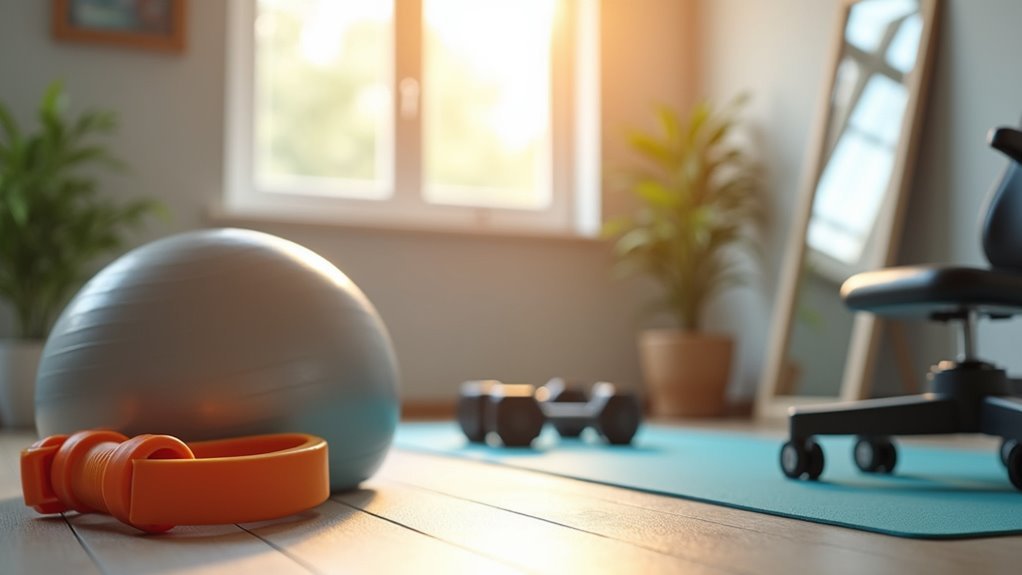
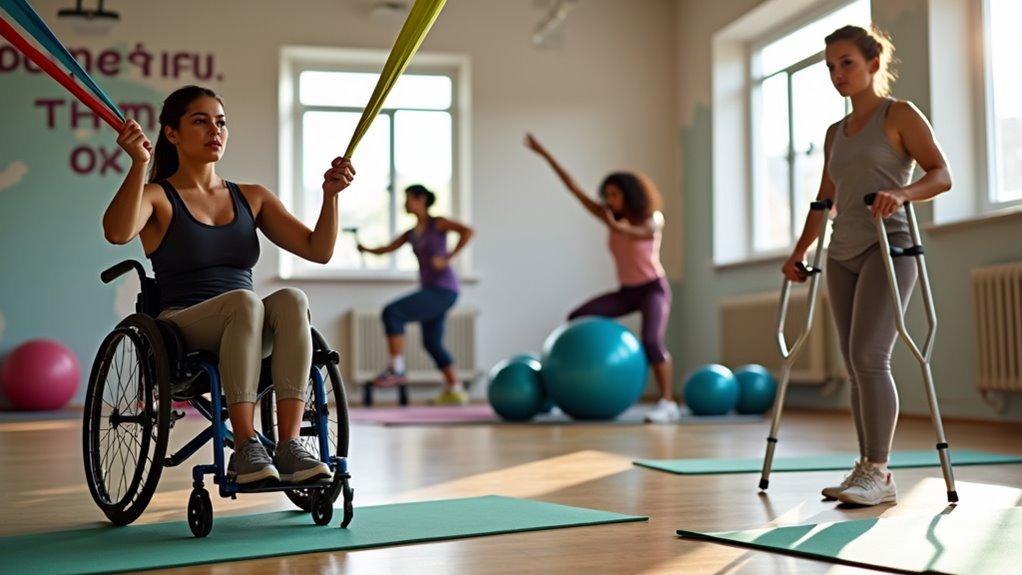
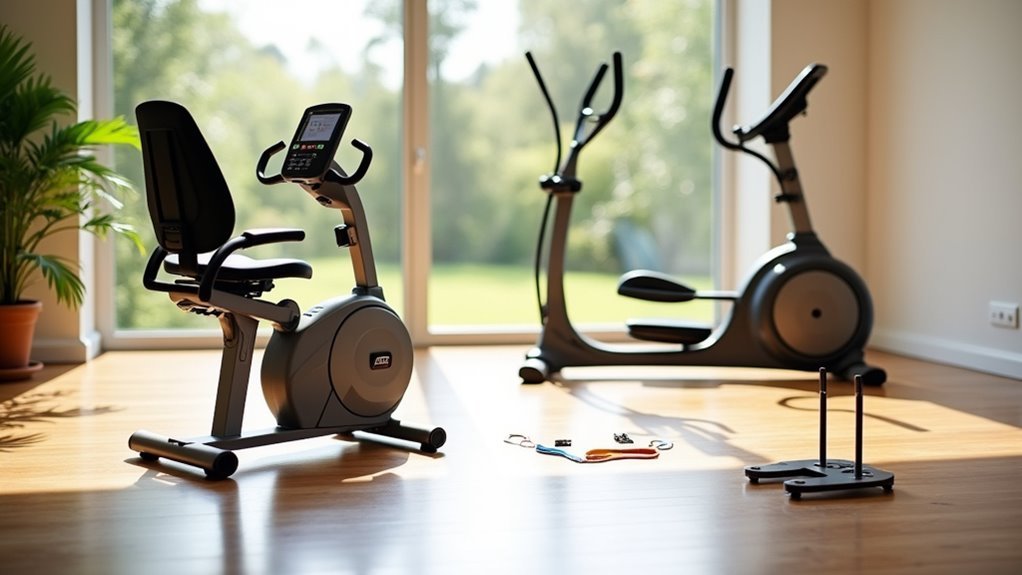
Leave a Reply